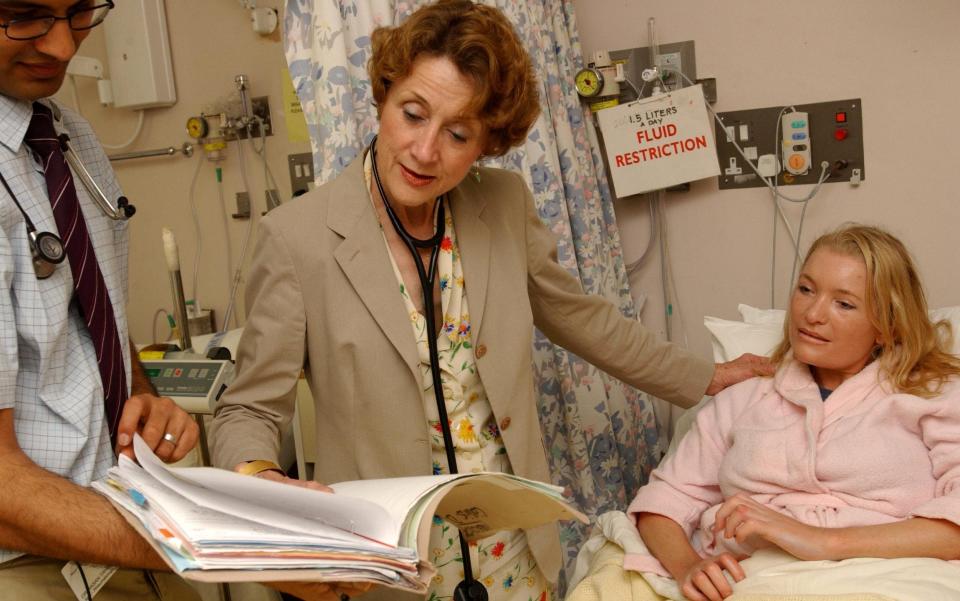Millions risk being condemned to a life on benefits, says sick note architect

Sick notes issued by GPs are no longer “fit for purpose” as Britain’s overstretched health service is allowing more people to “drift” into worklessness, the Government’s new occupational health tsar has said.
Dame Carol Black, who oversaw the creation of the current “fit note” system, said its failure risked condemning millions of people with manageable health conditions to a life on benefits.
The former president of the Royal College of Physicians played a crucial role in the construction of the current system. Her independent reviews in 2008 and 2011 led to the sick note being rebranded a “fit note”.
However, Dame Carol said the programme was failing because an increasingly “fragile” NHS left doctors with no choice but to issue repeated sick notes that left people who may be able to work stranded outside the labour force.
Almost 94pc of the 7.5 million people who saw a GP or other qualified medic regarding a fit note last year were signed off work. Many are not required to return to work for up to 12 weeks at a time, or longer in some circumstances.
Dame Carol, who has previously been commissioned by both Labour and the Tories to examine the causes of health-related economic inactivity, warned that both parties had failed to create a safety net that enabled people to keep working.
The rheumatologist accused successive governments of “stopping mid-flight” on the roll-out of key policies, branding a flagship scheme introduced in 2015 to help people deal with health conditions as “little more than a call centre”.
She warned that too many people were being consigned to an “inexorable journey into worklessness”.
Benefits paid to people of working age currently cost the taxpayer £69bn a year and Rishi Sunak has vowed to overhaul the system and tackle what he has called a “sick-note culture”.
The Prime Minister also wants to transform the “fit note” system designed by Dame Carol and introduced by Labour in 2010 to reduce the burden on GPs issuing them.
Ministers changed the law last year to allow fit notes to be issued by any physician, including nurses, pharmacists, physiotherapists and occupational therapists.
Dame Carol’s reforms were meant to keep more people with health problems in work by suggesting how employers could make adjustments to accommodate them. It would help make people “fit” for work.

She said: “The intention was that the fit note would be the beginning of a journey that would try to keep as many people as close to the labour market as possible and get them back into work as quickly as possible.”
However, Dame Carol said an overstretched NHS was unable to properly use the system because of pressure on the system.
“Sadly, less than 10pc are actually ‘fit notes’. It’s very low. Therefore, I have to come to the very sad conclusion that we didn’t succeed.”
Britain is currently in the grips of the worst sickness crisis on record, which is fuelling worklessness.
The share of working-age people who are economically inactive owing to long-term sickness has climbed relentlessly over the past four and a half years from two million in the summer of 2019 to 2.8 million today.
Overall, there are now 9.4 million people of working age who are economically inactive, the highest level in a decade.
Dame Carol, who is now chairman of the British Library, said the current process of being signed-off was allowing people to “lose contact” with the idea of going back to work.
NHS data shows more than 30,000 people were signed off work for between five to 12 weeks for mental and behavioural disorders in December 2023 alone.
Dame Carol, who worked as a doctor for three decades, said people should not be given a sick note for more than “four to six weeks” without having a thorough assessment of the next steps.
“If you let someone go beyond six weeks with a medical certificate, we know that you start going on a trajectory where you will not return to work.”
One in six people who drop out of the workforce because of ill health return to work in the first year after leaving. After 12 months, however, the rate drops to just one in 20.
“When you’ve been out of work for 20 weeks or more, very few people manage to make that journey back.”
The Office for Budget Responsibility (OBR) estimates more than half of the 2.8 million people of working-age who are inactive for health reasons have been out of work for more than three years, while half a million have never had a job.
The recent surge in sick notes is being fuelled by a mental health crisis and a sharp rise in back and neck problems. Of the 30,000 signed off in December, most were off for conditions related to anxiety, depression or stress. Almost 13,000 were related to musculoskeletal conditions.
Mel Stride, the Work and Pensions Secretary, has raised concerns that health professionals may be “labelling the normal ups and downs of human life as medical conditions which then actually serve to hold people back and, ultimately, drive up the benefit bill”.
While Dame Carol stressed that anxiety was “not a medical condition”, she said it was the responsibility of doctors and policymakers to show compassion.
“When you train as a doctor, what you’re taught is first to ‘do no harm’, and also to listen to the patient. If you tell me you’ve got back pain or that you’re anxious, stressed and a bit depressed, that is what you feel and it is my job to take that seriously.”
Dame Carol has only been off sick once in her career for a prolonged period of time. It was a daunting experience.
“I had some surgery. And by the third week I began to wonder if I could use my stethoscope properly. I started to wonder if I would be as good as I used to be at this job. And that was just three weeks.
“Imagine if you’ve been out of work for 20? People can be fearful of going back. It’s not an easy journey.”
Dame Carol returned to the idea that early intervention is vital.
“It is that waiting game of leaving you going down this inexorable journey into worklessness that is really harmful.
“And if you are not well educated and you don’t have lots of options, you’re fighting a very difficult battle, because many of these people are what are called deconditioned. They’re not work-ready. They’re a long way from the workplace. And they’re probably by now a bit depressed.”
Dame Carol’s report in 2008 put the economic cost of working-age ill health at around £100bn a year.
“It must be much more now,” she said. “I think every trend is now worse than it was in 2008.”
The OBR has estimated the increase in health-related inactivity alone was likely to cost the taxpayer an extra £6.8bn in 2023-24 as the benefits bill rises. This is in addition to £2.2bn in lost tax revenues.
Every individual who gives up looking for work for health reasons costs the NHS between £900 and £1,800 a year, the OBR has said.
Last week, the Government announced it was rolling out WorkWell to tackle the “spiral of sickness” and help people stay in work instead of being signed off for prolonged periods. The scheme aims to offer joined up local services to support people to stay in jobs rather than getting signed off.
A government spokesman said ministers were overhauling policies to create “a benefits system that’s fair on the taxpayer, and makes sure those who can work, do work”.
Despite concluding that the “fit note” system has failed, Dame Carol is still optimistic. Citing the success of Individual Placement and Support, a programme that helps people with drug addiction and mental health issues back to work, she insists anything is possible.
“If we can help people who have serious mental health problems, surely we can find a way of helping people who’ve got anxiety, stress and depression. We must move away from the idea that the answer is to move away from the world of work.”

